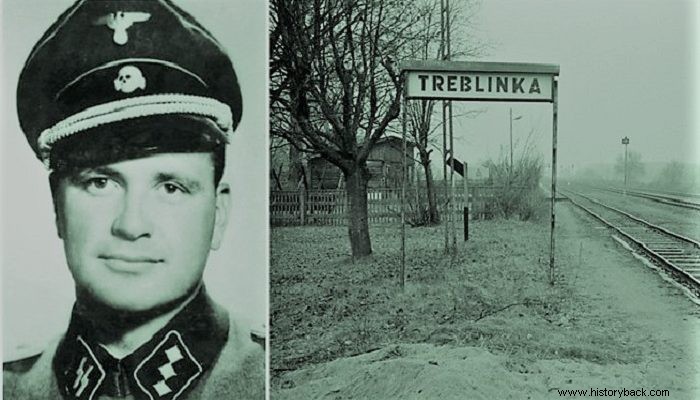
Kurt Franz was born in 1914 in Dusseldorf. In 1928 he left school and worked, eventually becoming a cook. In 1932 he joined the Nazi party, having previously joined various extremist organizations.
After his military service he joined the SS and served as a cook. But then he took up guard duties at the Buchenwald concentration camp, having been promoted to corporal.
In late 1939 he learned of the infamous T4 program, the "euthanasia" program (that is, of murder) of persons with special needs. He himself was not directly involved, initially, working as a cook again. Everything changed in 1942 when he was sent to the Belcek death camp and then to Treblinka in occupied Poland.
The monster of Treblinka
The Treblinka death camp was one of the three "Reinhardt Plans" along with Sobibor and Belcek, in which at least 700,000 people, possibly more, were exterminated.
In Treblinka, a deputy commander was placed in charge of disembarking the victims at the train station there, removing their belongings and finally locking them in the gas chambers and mass murdering them. Due to his features the prisoners called him "Doll" . But the former cook and current SS sergeant turned out to be a literal "plague".
The prisoners scared him and his German shepherd, Barry, whom he had trained to tear the prisoners to pieces. Franz was also the head of the guard which consisted of 80 Ukrainians, former prisoners of the Soviet army.
Franz, when he had nothing else to do, roamed the camp and woe betide any prisoner who, for whatever reason, caught his attention. He either tortured him personally, or ordered his dog to bite him in the genitals.
Franz also wrote the lyrics to the "Treblinka Hymn", a doomsday song that the Germans forced prisoners to sing. "Treblinka is my destiny, it's all I've got," went the humiliating song. He also liked to personally kill prisoners with his pistol or a hunting rifle he had. According to testimonies, there was not a single day when he did not kill at least one prisoner.
Because he was also a boxer, he often organized boxing matches by killing his weak victims himself, or using them as punching bags, for training, or even worse by having prisoners fight each other, reviving Roman duels.
He also enjoyed whipping his victims. At one point he saw a Jewish prisoner whom he shot in the back with a double barrel he was holding. Franz, laughing, ordered his thrashing victim to stand up. Suddenly his expression darkened as he saw that the testicles had not been tampered with. Frustrated, he looked for a new victim. On at least two occasions he killed infants by slamming them against a wall or kicking them.
In 1943 he was promoted to second lieutenant. However, on the day that the uprising broke out in the camp, he, along with four other SS and 16 Ukrainians, were swimming in the Bug River. After the uprising, he was placed in command of the camp with orders to wipe it off the face of the earth along with the traces of the mass horrific crime that took place there. The prisoners who participated in the work were all murdered after they were finished, by order of him.
An end he did not deserve
After Treblinka, Franz was sent to Italy where he participated in anti-partisan operations. The end of the war found him there. Franz managed to disappear. He worked as a laborer until 1919 and then as a cook in Dusseldorf until 1959 when he was finally arrested.
An album of photos from Treblinka titled "Good Years" was found in his home... During the so-called Treblinka trial, Franz denied all charges. He only admitted that he had once hit a prisoner.
In 1965 he was sentenced to life imprisonment. He was released for health reasons in 1993 and died in Wuppertal in 1998. He was a wretch who managed to escape the justice of the people, in relation to the magnitude of the crime in which he had participated.
